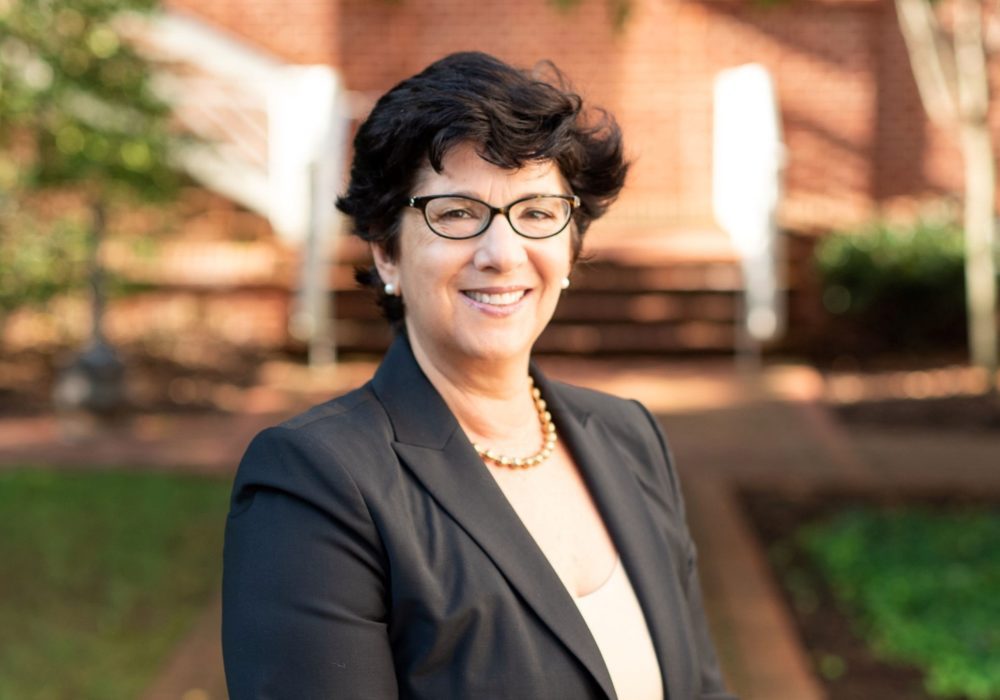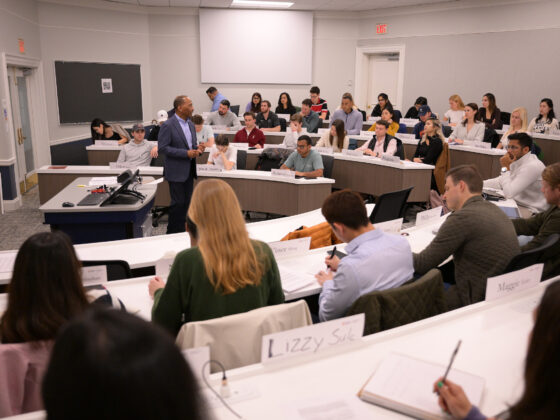In December, we highlighted our recent Full-Time MBA Employment Report, noting strong employment outcomes for international students in our Class of 2018: “The following employers hired at least two international students from our Class of 2018 – Amazon, Bain & Co., Barclays, Boston Consulting Group, Danaher, Deutsche Bank, Google, Fortive, Mastercard, McKinsey and Microsoft. In addition, 85% of international students received a job offer by three months after graduation, and 71% of these students accepted an offer for a job in the U.S.”
If you are an international student considering Darden, you likely have questions about the recruitment process, and we recently caught up with Denise Karaoli, Senior Associate Director, International Programs, Opportunities and Diversity, to talk a little more about the recruitment landscape in the U.S. and her advice for international students. Check out Denise’s answers below!
What is your role? How do you support international students?
For the past 12 years, my role with the Career Development Center (CDC) has been to focus on our international students’ needs for recruiting.
At Darden, all students will have an assigned section career advisor as well as access to industry specialist career advisors, and I support our international students as an additional resource and assist them with their job search in the U.S. and around the world. And this support begins before students even step on grounds.
I provide pre-matriculation and post-matriculation resources and classes to support our international students’ specific job search and soft-skill needs. I also collaborate with members of the Darden and UVA communities, as well as colleagues from other top business schools, and companies and recruiters, to keep apprised of the best practices to support our students.
Any stats to share about career outcomes for international students at Darden you would like to highlight?
Most of our international students come to Darden with the hopes of obtaining a career in the U.S., while others prefer to search for opportunities abroad. Consistently we have been able to fulfill both of these visions.
For our Class of 2018, 85% of our international students had job offers at graduation, and 71% had secured positions in the U.S. The top three industries international students entered were similar to our U.S. citizens: 31% of international students entered consulting positions, 21% accepted technology roles, and 13% entered careers in finance.
What are some of the biggest adjustments for international students when it comes to recruiting?
The biggest adjustment is simply transitioning to the U.S. recruiting process, which is often very different from what students experienced in their home countries.
For example, many of our international students previously relied only on their resume for recruiting. In the U.S., recruiters want to get to know the students before extending an interview invitation. This reality places more importance on networking, which is often a newer or less familiar practice for many international students. While it can seem a little abstract, networking is simply getting to know the people in the companies you are interested in, and it is great way to make personal connections and explore a target employer and its culture.
To help with this adjustment, Darden offers multiple resources, classes, and practice sessions to finesse networking. We start with your presentation to companies via your story and lead you through the process of building relationships. Most of the people you will meet with will be Darden alumni, and Darden alumni are well-known for their availability and responsiveness.
What advice do you have for international students seeking a role in the US?
Do as much assessment as you can now to identify your top career interests. This process typically has a few steps, and includes both self-reflection as well as more formalized engagement with your background, skills and aspirations. Once you are admitted to Darden, we will give you assessment tools that will help you better understand your interests and your strengths, as well as how these dimensions align with various job functions and industries. It’s important to have a focused approach to your first and second choice opportunities.
For now, I would encourage you to speak with as many people as possible in the functions and industries you are interested in. Use what we term in the U.S. “informational interviews” to understand these roles and determine if any are the right fit for you. You would be surprised how alumni, colleagues, relatives and friends are eager to speak with you about their job experiences.
This is also a great time to learn more about the industries and companies in the U.S.. Although we provide you with these resources upon matriculation, the earlier you can start this research the better. Here are some places where you can find information:
- U.S. Chamber of Commerce
- Trade Commissions at the U.S. embassies and Consulates
- Publications such as Vault and Wetfeet
And last but not least, conversational English is imperative for any U.S. job search. Before you start school, take English classes where you can speak with Americans. Seek out the Americans you work with or who live in your neighborhood. Start watching, in English, some of the shows that reflect U.S. culture – whether it be sitcoms, talk shows, newscasts, athletic events. Changing your language to American English on your computer and smartphone will also help with your language facility.
Much has been made about the current visa situation in the US – particularly around H1-B visas. How should students think about this situation?
Companies value hiring international students as they provide global perspective and diversity, but the H1-B visa challenges are really born out of scarcity. There are so many employers seeking top talent from overseas and there are a finite number of visas. Over the past two years, U.S. leadership has signaled an interest in creating a path for for increased corporate access to H-1B visas, but at this point, no definitive action has been taken.
What we do know is that our employers want top talent from overseas, and, at Darden, we make every effort to prepare our international students to be competitive in the U.S. recruiting landscape. If you follow the advice outlined above and partner with the Career Development Center, you can achieve a great deal.





